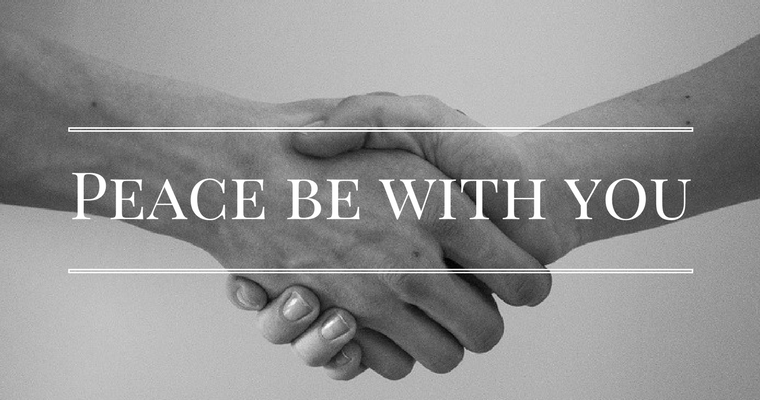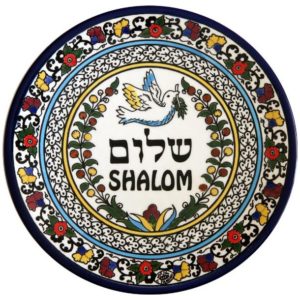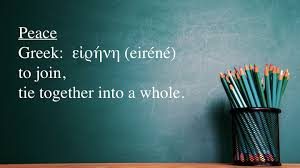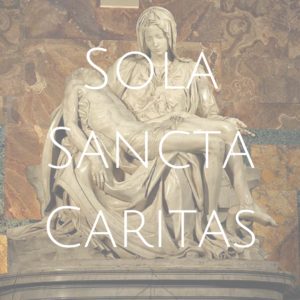Peace Be With You

This message was delivered at Mountain View UMC on Sunday, Oct. 1, 2017.
My message this morning is inspired by a few brief passages of scripture, and a personal need. These are very short passages, so don’t feel obligated to keep up in your own bibles today.
Matthew 5:9 “Blessed are the peacemakers, for they shall be called sons of God.”
Luke 10:5-6 “When you enter a house, first say, ‘Peace to this house.’ If someone who promotes peace is there, your peace will rest on them; if not, it will return to you.”
Matthew 10:12-13 “As you enter the home, give it your greeting. If the home is deserving, let your peace rest on it; if it is not, let your peace return to you.”
John 14:27 “Peace I leave with you; my peace I give you. I do not give to you as the world gives. Do not let your hearts be troubled and do not be afraid.
John 16:33 “I have said these things to you, that in me you may have peace. In the world, you will have tribulation. But take heart; I have overcome the world.”
John 20:19-23: On the evening of that first day of the week, when the disciples were together, with the doors locked for fear of the Jewish leaders, Jesus came and stood among them and said, “Peace be with you!” After he said this, he showed them his hands and side. The disciples were overjoyed when they saw the Lord.
Again Jesus said: “Peace be with you! As the Father has sent me, I am sending you.” And with that he breathed on them and said, “Receive the Holy Spirit. If you forgive anyone’s sins, their sins are forgiven; if you do not forgive them, they are not forgiven.”
The Word of God for the people of God. (response: Thanks be to God.)
May the words of my mouth and the meditations of my heart be pleasing unto you, O Lord, our rock and redeemer. Amen.
Many pastors who follow the lectionary are preaching on Philippians 2:1-13 today because it lets them discuss a rather controversial and volatile racial justice issue involving knees and nationalism. You can thank me for this later, but I chose not to go there for a reason: I need to find some peace, and I think maybe we all do by now. Amen?
Remember when we would take time at the beginning of each Sunday service to greet one another? The activity of “greeting” one another comes from an older tradition called “Passing the Peace”. “Peace be with you” is the traditional greeting among Christians, and normally elicits the response, “And also with you.” Passing the peace started with Jesus, has hung around for most of the last two thousand years and, although it’s becoming used less and less often, has an important role in building our faith.
There is a distinct purpose in this traditional activity. Passing the peace reminds us of our role as peacemakers. When we do this on a regular basis, it’s like teaching little children to say please and thank you. It feels clumsy and awkward and kind of weird at first, but the more often we say it to one another and the more often we respond in kind when someone says it to us, the more comfortable we become with it, the more natural it is, and the more we tend to do it automatically. That repetition of saying “Peace be with you,” and of giving and receiving the response “and also with you” trains our heads, our hands, our hearts and even our tongues in the way of peace.
John F. Kennedy said,
“Peace is a daily process, gradually changing opinions, slowly eroding old barriers, quietly building new structures.”
Spiritual Author Eckhart Tolle says,
“Peace is one of the most important of human experiences. If you don’t have peace, then you’re not able to appreciate whatever else you do have. You may not even be able to recognize the good in your life because you have not recognized the good in yourself.”
Tolle’s right about the importance of peace, although I’m not sure what his definition of peace is the same as the peace Christ promises to leave with us in John 14.
 Shalom, the Hebrew word translated to peace in English language Bibles, appears 237 times in the Old Testament. There are 92 occurrences of eiréné, the Greek word translated into peace, in the New Testament, 25 of which are in the Gospels, so eiréné is our focus this morning.
Shalom, the Hebrew word translated to peace in English language Bibles, appears 237 times in the Old Testament. There are 92 occurrences of eiréné, the Greek word translated into peace, in the New Testament, 25 of which are in the Gospels, so eiréné is our focus this morning.
Eiréné has a number of meanings, depending on which lexicon you use. Strong’s Greek Concordance defines it as peace or peace of mind, and their Exhaustive Concordance defines it as one, peace, quietness, and rest. Thayer’s Greek Lexicon has several definitions: a state of national tranquility (we could definitely use some of that, couldn’t we?); exemption from the rage and havoc of war (I can think of millions of people that want that definition of peace); peace between individuals, harmony, concord; in the spirit of the Hebrew word, shalom, security, safety, prosperity, and felicity; the Messiah’s peace that the angels told us about in Luke 2 when they came to tell us about his coming; a distinctly peculiar Christian definition of “the tranquil state of a soul assured of its salvation through Christ, and so fearing nothing from God and content with its earthly lot, of … whatsoever sort that is”; and, lastly, the blessed state of devout and upright men after death. I’m not sure I’m patient enough to wait for that one.
But my favorite definition comes from HELPS Word-studies. It says that eiréné comes from the word eiro, meaning “to join, to tie together into a whole”, so eiréné properly means wholeness, i.e. when all essential parts are joined together. In their words … “peace is God’s gift of wholeness.”
 Let that sink in for just a minute … Eiréné, peace … is God’s gift of wholeness.
Let that sink in for just a minute … Eiréné, peace … is God’s gift of wholeness.
I don’t know about all of you, but I am seriously craving that gift of wholeness, of true, … inextinguishable … peace. The world seems to be crashing around me, around those I love, even around itself, more and more each day to the point that I find myself becoming exhausted from trying – usually unsuccessfully – to fend off the ways of the world – the anger, the hate, the turmoil, the stress, the constant threats of war, the insistence that we fear this or that or them or other to the degree that it’s a struggle to love myself, let alone my neighbors as myself. And I don’t even want to talk about loving enemies right now.
But … if I don’t love my neighbors and my enemies as Christ loves me, then those things I do for them … any good works(?) … become empty … they’re done in vain. Likewise, if I don’t fully and completely love my neighbors and my enemies, all of whom – saint and sinner alike – are created in the image of God just as I am, do I sincerely and fully and completely love … God?
So, the question spoken in my prayer for guidance for this morning’s message then was, “What do I need to do, to fix about myself, in order to be able to love – honestly, genuinely, sincerely love – my neighbors and my enemies and myself, so that I am able to accept your gift of wholeness and to use that gift as a peacemaker?”
 The answer came, believe it or not, through a Twitter profile that led me to a transcript of an address given by Dr. Joseph Dongell. Dongell is a Holiness Movement Wesleyan, professor of biblical studies and Director of Greek studies at Asbury Theological Seminary. The address, titled Sola Sancta Caritas, is based on Dongell’s personal study of the 14-volume Jackson set of John Wesley’s works; in other words, a whole lot of Wesley’s journals, all 150 sermons, numerous treatises of various sorts, and countless letters Wesley had written to other people.
The answer came, believe it or not, through a Twitter profile that led me to a transcript of an address given by Dr. Joseph Dongell. Dongell is a Holiness Movement Wesleyan, professor of biblical studies and Director of Greek studies at Asbury Theological Seminary. The address, titled Sola Sancta Caritas, is based on Dongell’s personal study of the 14-volume Jackson set of John Wesley’s works; in other words, a whole lot of Wesley’s journals, all 150 sermons, numerous treatises of various sorts, and countless letters Wesley had written to other people.
Dongell, who’s religious upbringing was focused on spiritual cleansing and empowerment, found to his surprise an over-arching theme in Wesley’s works, that theme being … Love. Writing about his discoveries, Dongell says, “love rushed through all fourteen volumes like a tsunami” and, “It seemed that Wesley was standing on his head and shouting to draw attention to love.” Dongell noted that all Christians agree love is important, but Dongell felt Wesley was saying something more; that Wesley has a specific understanding of how love works across the whole Christian life, and how love becomes the center of operation for all things.
Dongell went on to layout five proposals on how he perceives the way Wesley understood love:
1) The love Wesley is leading us to is deep. It cannot be defined by general human intuition, cultural sensibilities or supposed ethical overlap of all the World’s religions. Jesus put forward his whole life as the defining pattern for the love he commands when he says, “Love one another as I have loved you.”
2) Love isn’t an action; it is something prior to and beneath the action it sponsors. “Love is a matter of the heart, a disposition that is deeper and longer lasting than the specific actions we undertake.” God demonstrated His love for us by sending His only son. God already loved us when He sent Christ to us.
3) Love, true, sincere, genuine love’s origin is God Himself. John wrote in 1 John 4:8, “God is love.” Therefore, we cannot love our enemies simply by deciding to do so; we cannot become people of love through and through simply by determining to be such. If we are not filled with God, we cannot sincerely love.
4) If love is a gift from God, then we need to ask Him to fill us with it! The fact that one is a Christian, even a spiritually gifted and effective Christian, is not yet proof that one has undergone the deeper reception of God’s love. Love is something we must seek and must seek with the expectation that God will actually satisfy our quest and give it to us.
5) If love does fill our hearts, then our hearts will be so filled with love there will be no room left in them for any evil intention, desire and design; no room for malice, for judgment, for hate. A heart filled with God’s love cannot lie to you, steal from you, damage your reputation, hurt you in any physical or mental way, fear you, or hate you.
According to Dongell, John Wesley makes “frequent, precise, programmatic” declarations throughout his writing, asserting, in fact insisting that we need to be filled with the love of God, with love from God – with, in Dongell’s words, Sola Sancta Caritas – Only … Holy … Love. No other kind.
Dongell’s entire address is very interesting, so much so, that I’m leaving a printed copy of it in the church library and I encourage you to read it for yourself, but I want to get to why it was key in my personal search for peace.
All Christians are called to be peacemakers, but I think pastors are especially called to that role. I know if God were to judge me today, He would find my soul wanting when it comes to peacemaking.
Rev. Robert Wright Lee, IV, is a direct descendant of Gen. Robert E. Lee. Rev. Lee gained national attention several weeks ago when appeared on MTV’s VMA awards program, and spoke out against not only the racial violence in Charlottesville, but the efforts to “protect” monuments to his own ancestor. He’s been catching flack for that ever since, so much so that he had to resign his pastorate just to give his church some peace. Rev. Lee wrote something the other day, and I asked his permission to share it with you this morning:
“Mother Alexander once told me that I carry with me the ancestor of Robert E. Lee whether I like it or not… I’ve made peace with my ancestor by engaging the legacy I so ardently disagree with.”
Steven Furtick, a mega-church pastor in Florida says, “What is not healed is handed down.” In other words, we pass beliefs, biases, and hate from generation to generation unless – finally – someone says, “No! I will not teach this to my children!”
As I mentioned earlier, all of the things happening in my own world and in the larger world – especially those that would or could have direct impact on me or my loved ones – have been weighing so heavily on me, that I was struggling to love anyone, even myself, and especially my enemies. On the other hand, I was having absolutely no trouble not loving. Every single bit of warrior DNA from 1200 years of my own ancestors in 7 countries on 2 continents and the British Isles has been in full-on fight mode for at least 8 months, more like going on 20 years. In other words, I’m not making peace with the legacy of my ancestors. I’m giving it free-reign. Worse, I’m teaching it to my kids. I’m handing it down.
When I let all the negative stuff – the frustration, hurt, anger, outrage, indignation, injustice, fear and worse – when I let all that stuff fill me, then there is no room for Sola Sancta Caritas – for only holy love. The repercussion of that is that I begin to feel unworthy of receiving both God’s love and God’s gift of wholeness, of peace, and I subconsciously don’t accept it because I know I’m a broken and unclean vessel.
Bernice King, daughter of Martin Luther King, wrote just last night,
“Be careful with your energy, yielding none of it to hate. Hate does no good and helps those who are vessels for injustice meet their goals.” I don’t want to be a vessel filled with hate and anger and stress and turmoil, a vessel for injustice.
Philosopher Dallas Willard said,
“The power to bless someone who offends us comes from God’s strength, love and peace flowing in our soul.”
I need both His holy love and his peace, his gift of wholeness. Don’t you?
Peace be with you, my friends. Let’s pray.
Father God, Creator of heaven and earth, sea and sky, and all that flows, grows, crawls, walks, swims and flies upon it, you have created each of us – saint and sinner alike – in your image, and we thank you, God, for loving us when we are clearly undeserving.
Today, God, we stand before you and ask your mercy and forgiveness. Please, Lord, help us empty ourselves of the ways of the world and fill us so full instead with your blessed holy love that we glow like candles in the darkness to all others who desperately need to see, know you, and to know your love.
Fill us with holy love, God, and bless us with eiréné – with your gift of wholeness, your peace. Guide us to become the peacemakers for this, our time, in your Kingdom on earth. Teach us your ways. Strengthen us for your work. Lead us where you would have us follow.
In Jesus name we pray. Amen.
You must be logged in to post a comment.